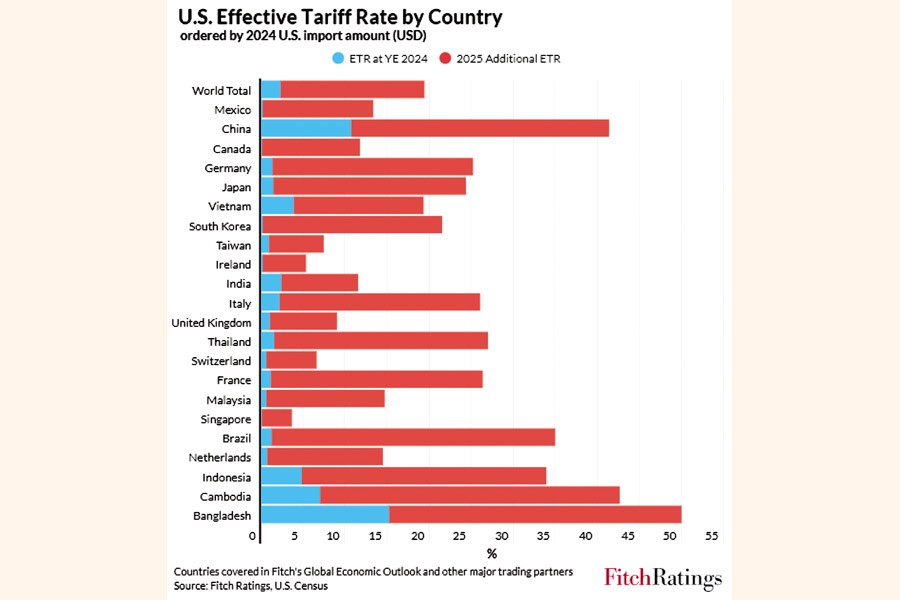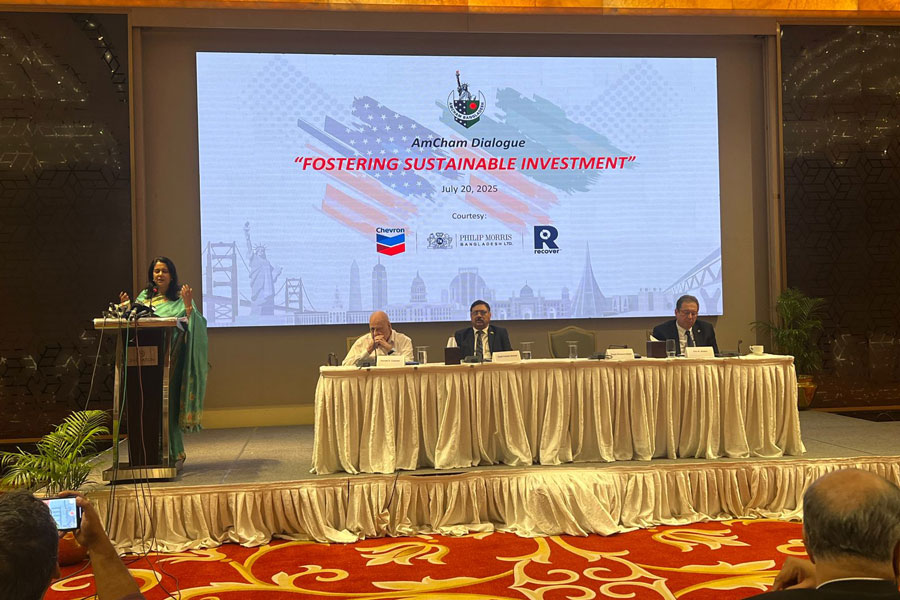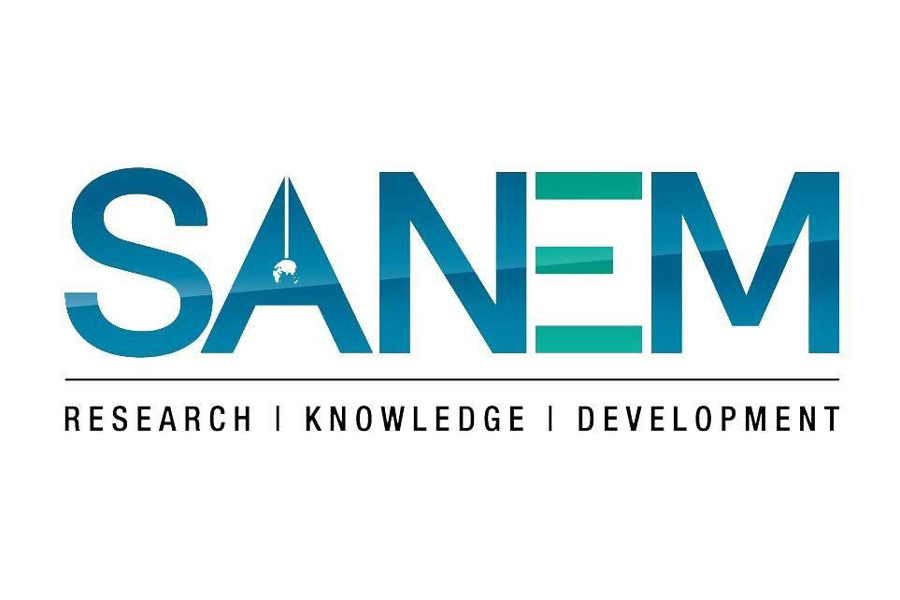Saif
Senior Member
- Joined
- Jan 24, 2024
- Messages
- 17,081
- Likes
- 8,163
- Nation

- Residence

- Axis Group


BD set to bear highest duty among US trade partners
Bangladesh could face the highest effective tariff rate (ETR) among US trading partners-approximately 50 per cent -under the Trump tariff regime effective August 01, Fitch Ratings shows such duty disparities, released on July 18. The newly announced 35 per cent, outlined in formal letters from the
FITCH FINDINGS ON TRUMP TARIFF DISPARITIES
BD set to bear highest duty among US trade partners
Existing 15, new 35 aggregate to 50pc
Jasim Uddin Haroon
Published :
Jul 19, 2025 09:00
Updated :
Jul 19, 2025 09:00

Bangladesh could face the highest effective tariff rate (ETR) among US trading partners-approximately 50 per cent -under the Trump tariff regime effective August 01, Fitch Ratings shows such duty disparities, released on July 18.
The newly announced 35 per cent, outlined in formal letters from the US government, and the existing 15-percent duty on Bangladeshi exports to the American market aggregate to this steep figure.
Fitch's latest update to its U.S. Effective Tariff Rate (ETR) Monitor, an interactive tool tracking tariff developments, shows Bangladesh will bear the brunt of the new measures as it does not benefit from tariff exemptions or carve-outs offered to some other countries.
Meanwhile, as the countdown to the cutoff time for the unusual tariff hike progresses, Bangladesh is engrossed in finding response to US-set conditions deemed beyond trade and tariffs so Washington could rethink levying the ramped-up duty.
The global ratings agency has developed the interactive tariff tool to calculate the ETR on imports from US partners in trade and quantify current duties.
This calculation considers exclusion like "carveouts for oil and gas, copper, and pharmaceutical imports". This tool is updated whenever significant changes in US tariff policy occur.
In contrast, China's ETR remains unchanged at 41.4 per cent due to no revisions in its reciprocal tariff rate.
Meanwhile, the US ETR itself is set to rise to 19.4 per cent, up from 14.1 per cent, driven by increased reciprocal tariffs and the implementation of new duties on copper imports.
These changes align with the rates detailed in recent bilateral communications and announced trade arrangements.
Further upward pressure on the US ETR is anticipated if additional tariffs on semiconductors, electronic components, and pharmaceuticals-currently under section 232 investigation-take effect as expected on August 01. A scenario modeled by Fitch includes a 25-percent tariff on these imports, which would raise the overall ETR to approximately 23.7 per cent.
President Donald Trump has extended a pause on country-specific reciprocal tariffs announced in April but has sent letters to select countries outlining new rates ranging from 25 per cent to 50 per cent.
For the majority of countries not covered by these letters, the US will continue to impose a baseline tariff of 10 per cent.
However, Trump has indicated the possibility of introducing a blanket tariff of 10 per cent to 15 per cent on about 150 countries.
New bilateral trade deals with Vietnam and Indonesia were also announced, setting reciprocal tariffs at 20 per cent and 19 per cent respectively.
Among other notable changes, copper imports will now carry 50-percent duty, while Canada and Mexico face increased tariffs of 35 per cent and 30 per cent , raising their respective ETRs to 11.7 per cent and 13.1 per cent, up from 7.5 per cent and 9.5 per cent .
These projections assume that about half of previously tariff-free imports will be reclassified as compliant under the USMCA agreement.
In the case of the European Union, reciprocal tariffs are set to rise to 30 per cent from 20 per cent, resulting in varying ETRs for individual EU countries-ranging from 12 per cent to over 30 per cent-depending on their trade mix with the United States. ETR reflects the total duties paid as a percentage of total import value and varies based on changes in import composition and source countries.
Fitch's ETR Monitor provides sector-specific and country-specific breakdowns of import volumes and duties through 2025, covering key US trade partners, including China, the EU, Japan, Vietnam, Canada, and Mexico.
The interactive tool allows users to simulate different tariff scenarios by adjusting sectoral and country-specific rates and import volumes. It will be updated in real-time as major shifts in US trade policy unfold.
BD set to bear highest duty among US trade partners
Existing 15, new 35 aggregate to 50pc
Jasim Uddin Haroon
Published :
Jul 19, 2025 09:00
Updated :
Jul 19, 2025 09:00
Bangladesh could face the highest effective tariff rate (ETR) among US trading partners-approximately 50 per cent -under the Trump tariff regime effective August 01, Fitch Ratings shows such duty disparities, released on July 18.
The newly announced 35 per cent, outlined in formal letters from the US government, and the existing 15-percent duty on Bangladeshi exports to the American market aggregate to this steep figure.
Fitch's latest update to its U.S. Effective Tariff Rate (ETR) Monitor, an interactive tool tracking tariff developments, shows Bangladesh will bear the brunt of the new measures as it does not benefit from tariff exemptions or carve-outs offered to some other countries.
Meanwhile, as the countdown to the cutoff time for the unusual tariff hike progresses, Bangladesh is engrossed in finding response to US-set conditions deemed beyond trade and tariffs so Washington could rethink levying the ramped-up duty.
The global ratings agency has developed the interactive tariff tool to calculate the ETR on imports from US partners in trade and quantify current duties.
This calculation considers exclusion like "carveouts for oil and gas, copper, and pharmaceutical imports". This tool is updated whenever significant changes in US tariff policy occur.
In contrast, China's ETR remains unchanged at 41.4 per cent due to no revisions in its reciprocal tariff rate.
Meanwhile, the US ETR itself is set to rise to 19.4 per cent, up from 14.1 per cent, driven by increased reciprocal tariffs and the implementation of new duties on copper imports.
These changes align with the rates detailed in recent bilateral communications and announced trade arrangements.
Further upward pressure on the US ETR is anticipated if additional tariffs on semiconductors, electronic components, and pharmaceuticals-currently under section 232 investigation-take effect as expected on August 01. A scenario modeled by Fitch includes a 25-percent tariff on these imports, which would raise the overall ETR to approximately 23.7 per cent.
President Donald Trump has extended a pause on country-specific reciprocal tariffs announced in April but has sent letters to select countries outlining new rates ranging from 25 per cent to 50 per cent.
For the majority of countries not covered by these letters, the US will continue to impose a baseline tariff of 10 per cent.
However, Trump has indicated the possibility of introducing a blanket tariff of 10 per cent to 15 per cent on about 150 countries.
New bilateral trade deals with Vietnam and Indonesia were also announced, setting reciprocal tariffs at 20 per cent and 19 per cent respectively.
Among other notable changes, copper imports will now carry 50-percent duty, while Canada and Mexico face increased tariffs of 35 per cent and 30 per cent , raising their respective ETRs to 11.7 per cent and 13.1 per cent, up from 7.5 per cent and 9.5 per cent .
These projections assume that about half of previously tariff-free imports will be reclassified as compliant under the USMCA agreement.
In the case of the European Union, reciprocal tariffs are set to rise to 30 per cent from 20 per cent, resulting in varying ETRs for individual EU countries-ranging from 12 per cent to over 30 per cent-depending on their trade mix with the United States. ETR reflects the total duties paid as a percentage of total import value and varies based on changes in import composition and source countries.
Fitch's ETR Monitor provides sector-specific and country-specific breakdowns of import volumes and duties through 2025, covering key US trade partners, including China, the EU, Japan, Vietnam, Canada, and Mexico.
The interactive tool allows users to simulate different tariff scenarios by adjusting sectoral and country-specific rates and import volumes. It will be updated in real-time as major shifts in US trade policy unfold.









































